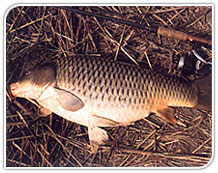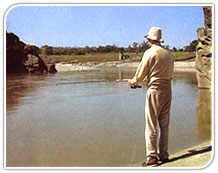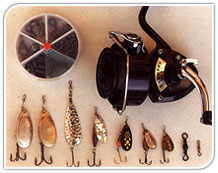Angling: Mahseer (Barbus Tor) Fishing
 The
Barbus Tor, popularly called the Mahseer or the Tiger of the Indian
Rivers, is one of the largest freshwater fish and one of the greatest
fighting fish in the world. It is natural to Indian lakes and streams and
can attain sizes upto 5.5 ft and weigh over 50 kgs.
The
Barbus Tor, popularly called the Mahseer or the Tiger of the Indian
Rivers, is one of the largest freshwater fish and one of the greatest
fighting fish in the world. It is natural to Indian lakes and streams and
can attain sizes upto 5.5 ft and weigh over 50 kgs.
Mahseer is
generally found in the rivers of the Terai regions of the Himalayas, the
Shivalik Hills in thenorth, and the river Kaveri in the south, where it
has been fished for successfully with rod and line. The Mahseer is found
where the river speeds through narrow gorges and spills out over a rocky
river bed. The larger fish are found above large rapids and in the pools
below the falls.
ESTABLISHED MAHSEER WATERS:
Mahseer
country stretches between the Hindu Kush-Kabul-Kohistan watershed in the
west all the way to the eastern tributaries of the Brahmaputra. It is
found in some rivers in the Deccan plateau region and the river Kaveri in
the south central region ofKamataka.
Mahseer is essentially a
migratory fish, running up and into side streams For spawning, at
elevations of upto 2000 metres during the monsoon. The fish avoids very
cold water and therefore frequents the lower portion of the Himalayan
streams during winter. The fish breeds three times a year:
January-February, May-June and July-September, which is the peak season.
It lays eggs amongst the boulders in shallow pools. The big ones are
generally landed when returning from the breeding grounds when they chase
shoals of minnows.
Angling for Mahseer is an adventure. The fish
lurks around the big boulders of rocky beds or frolics near the sandy
beds. Every cast could be a potential strike. Once the fish strikes, yards
of line are tugged and you could snap your rod or be pulled in yourself.
The technique lies in first keeping your line taut for a split second to
ensure that the hook is well embedded and then letting the fish run with
the line. This is where the battle starts. It will go down a tall or rapid
and your physical abilities of hopping over boulders will be tested. The
next minute it might decide to dart towards the opposite bank. As you try
and reel in the slack it might tear off with a sudden burst of energy
behind a boulder. You have to follow him by crag and torrent till his rush
is spent. The fish is a fighter to the very end; hence even landing a
tired Mahseer is not simple. You may use a gaff or a net, or even try and
beach it through small pools and boulders. It is only when you have your
fish on dry land that you can call the end of the battle.
 The
areas where angling for Mahseer can be profitably pursued:
The
areas where angling for Mahseer can be profitably pursued:
River
Beas (Himachal Pradesh and Punjab):
From Dehra Gopipur upto the
Pong Dam reservoir. Below the Pong Dam at Talwara (Punjab). Harike barrage
on the Ferozpur Road. The river can be conveniently approached by car or
jeep. The region below the dam falls in Punjab. Best period is February
-May and September -November.
River Jhelum (J&K)
Below
the Water lake on the Sopore -Rampur stretch 80 kms from Srinagar. Best
period is May-June and September-October.
River Ganga
Stretch above Tehri (10 km):
Stay at Inspection or PWD Bungalow
at Tehri. Beasghat - Approached by an 8 km trek from Kuriala on the
Rishikesh-Devprayag Road. For this spot all camping equipment and
provisions etc. must be carried.
Gangalehri -
Stretch
of the river where the river Son has a confluence with the Ganga.
Connected by a motorable track off the main Haridwar-Rishikesh Road.
Accommodation must be arranged at Dehra Dun, Haridwar or Rishikesh. Best
period is September-November and February-May.
River Bhoroli
(Arunachal):
Located 60 kms from Tezpur, which is connected by
Indian Airlines flights. The river is fished between Tipee and Bhalukpong
as it flows through the Balipara reserved forest. For best results an
inflatable raft should be used to make use of the full run of the river.
River
Manas (Assam):
Located in the famous Manas wild life sanctuary,
the river affords excellent wild life viewing in addition to Mahseer
fishing. Stay at Manas Forest Lodge or camp. All provisions must be
carried. The river will provide good sport, especially in case a raft is
utilized to run the river. Best period is October-April. Note: Foreign
Nationals require restricted area permits from the Ministry of Home
Affairs to visit this area.
River Kaveri (Karnataka):
Located 2.5 hours by road from Bangalore, the Kabini River Lodge
provides lodgings. (The largest Mahseer weighing 43 kgs has been landed
here on 20 January 1985). Angling is organised from the banks of the river
or in a local country boat called 'Coracle'. The river is divided into
beats where anglers can change beats during each session. Best period is
November-March.
 EQUIPMENT
FOR MAHSEER FISHING RODS :
EQUIPMENT
FOR MAHSEER FISHING RODS :
Stiff action rods for casting
spinners, lures and plugs between 25 to 50 gms. Heavy pike fibre glass
rods 8 to 10 ft. long are ideal. For light fishing of upto 20 Ibos, a
medium action rod is ideal. Two rods are a must.
REELS : Open
face spinning reels like ABU Ambassadeur 7000 or 7000 C and ABU 770 or 440
are ideal. Some spares are essential as they are not always locally
available.
LINE : 10/12 Ib. for light fishing and 20/30 Ib
for larger waters of Nylorfi or Maxima brands or similar quality.
Preferred colours are green or brown. There must be 200 metres line on
each reel.
LURES :Lures upto 1 ounce (28 gms) silver, and
combinations of silver/blue/green. Rappala 7"-9" sinking plugs.
Tobys and wobblers of various shapes and sizes and of silver/ brass
colours. Spoons, spinners of sizes 2 to 5 like Mepps of silver, brass and
copper colours. Minnows of medium size. Other items required include a
gaffplanding net, swivels, a disgorger, a thick silk cord to hold the
fish, tools, lead weight of various sizes and a jack knife.
PERSONAL
CLOTHING
The following items of clothing and toiletries will go a
long way in providing comfort to the angler. A light, brimmed sun hat.
Light-tinted sunglasses. Pair of warm thin gloves for early morning cold.
A thick windcheater. Waders. Two pairs of keds. Suntan oil. Insect
repellent. Some band aids and antiseptic ointment.
 The
Barbus Tor, popularly called the Mahseer or the Tiger of the Indian
Rivers, is one of the largest freshwater fish and one of the greatest
fighting fish in the world. It is natural to Indian lakes and streams and
can attain sizes upto 5.5 ft and weigh over 50 kgs.
The
Barbus Tor, popularly called the Mahseer or the Tiger of the Indian
Rivers, is one of the largest freshwater fish and one of the greatest
fighting fish in the world. It is natural to Indian lakes and streams and
can attain sizes upto 5.5 ft and weigh over 50 kgs.  The
areas where angling for Mahseer can be profitably pursued:
The
areas where angling for Mahseer can be profitably pursued:  EQUIPMENT
FOR MAHSEER FISHING RODS :
EQUIPMENT
FOR MAHSEER FISHING RODS :